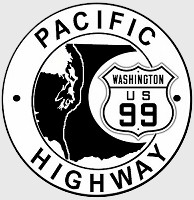
The Historic Pacific Highway
in Washington
Rights of the British

The Historic Pacific Highway
in Washington
Rights of the British
Rights of the British
Part IV
By Edward Huggins
The Sunday Oregonian
August 26, 1900
I suppose I would better finish my explanation about the two companies and,
tell how it came about that they disappeared from the American side of the
boundary line, and left hardly a trace behind. I fancy there are not a great
many people in this country who recollect that the companies formed so
important a part in the affairs and future prosperity of a majority of the
farmers of Pierce County. Of course, these Britishers were looked upon as
intruders, without a particle of right to be here.
At all events, the only rights they could possibly claim were the few acres of land they had enclosed around their various forts and the seven or eight small stations, or farms they owned at various points upon the property claimed. At Nisqually, the Puget Sound Company had running and feeding upon the Nisqually Plain, from 5,000 to 8,000 head of cattle, about 8,000 or 10,000 sheep and 300 horses.
It also had 50 or 75 hands; Englishmen, Scotchmen, Canadian-Frenchmen, kanakas, half breeds, and Indians. An officer in charge and two or three, sometimes four, clerks were employed at the fort. In 1850, when I arrived here, the Hudson's Bay Company owned the fort and goods in store, and the Puget Sound Company owned the livestock, and claimed ownership of the 180.000 acres of land.
In 1854-55, all the property upon the place was sold to the Puget Sound Agricultural Company, the Hudson's Bay Company retaining the fur trade, carried on at the post, which, as the country became settled up, became of less value, because of opposition, and the high prices the company was forced to pay for furs. O, what a difference! In the early '50s the company had it all its own way, and fixed prices to suit itself, but when opposition commenced, there was a different state of things.
The company, to my knowledge, never paid an Indian coin for any thing; always goods. In 1850, goods fetched a high price. California gold mining times, you know! A three-point blanket was worth from $5 to $6; common green and red baize, $1 a yard; printed cotton, 25 cents a yard; common unbleached sheeting; only 26 inches wide, six yards for $1; common hickory shirts, $1 to $1.75 each; gunpowder, $1 a pound; ball and shot, 25 cents a pound; guns, flintlock, which cost in London, $5, were sold here at $16 each and other goods in proportion.
Flour was very high in the '50s, and I have often sold a barrel for a California made coin called the slug. It had eight sides and passed for $50. It was a very awkward and inconvenient coin, and the Government soon called them all in, and they quickly disappeared. Oftentimes the flour sold for $50 a barrel was sour, and when the barrel was opened it came out in large, hard cakes.
There are men in the country who recollect this flour. It came from Boston. Wheat was worth then $5 a bushel, but there was very little to be obtained in the country, even at that price. Onions readily fetched $5 a bushel; potatoes in proportion. I recollect hearing it said that some of the earlier farmers who settled near the mouth of the Cowlitz River made a large amount of money by the sale of a heavy crop of onions they were lucky enough to have raised that season.
I think Charles Catlin, formerly prominent in Tacoma, was one of the farmers in question. But the big demand soon fell off, and the big prices did not remain long, but still, for a long time, what would now be considered high prices, were obtained for all kinds of produce. When wheat got down to $1; oats 50 cents, potatoes the same, a bushel, the farmers groaned in anguish and predicted nothing but poverty and misery for the future.
In 1854 the company had on hand, I think, about $70,000 or $80,000 worth of goods, principally heavy articles. I recollect they had in store upwards of 6,000 heavy blankets, many cases of printed calico and bales of bleached and unbleached sheeting, an enormous number of dozens of shirts, many guns, all flintlocks, and several 100 pound barrels ot gunpowder of best quality, and a large amount of shot and ball.
All the company's goods, at that time were of good quality; I mean good and strong in contradistinction to the American- made goods then brought to this country, which were generally of a flimsy character, and the Indians would always prefer King George's goods to those of Boston manufacture.